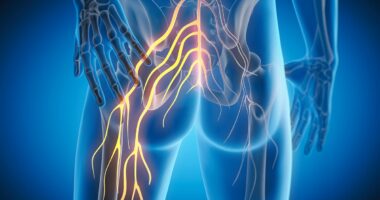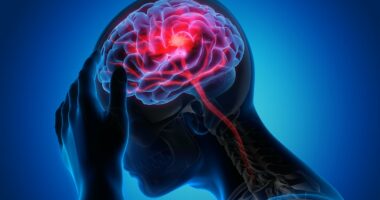Share this @internewscast.com
You’re never too old to learn something new about yourself—just ask Annie Lennox, who was diagnosed with ADHD at age 70.
The Eurythmics star disclosed her diagnosis of a neurodevelopmental condition that affects concentration, impulse control, and activity levels during an appearance on the BBC radio program Woman’s Hour last month.
The Scottish singer told presenter Nuala McGovern that she had ‘passed her diagnostic assessment with flying colours’.
She said: ‘I’m a magpie, I observe things, I’m highly sensitive. And I found out that I am actually a bit neurodivergent.
‘It’s explained a great deal to me about how my mind works and how other people with ADHD, how their mind works.’
Annie joins thousands of women who have realized later in life that they have been living with undiagnosed attention deficit hyperactivity disorder (ADHD).
In the past ten years, there has been a significant rise in the number of adult women who have been identified as having the neurodivergent condition, which can lead to both mental and physical impulsivity and restlessness.
Much of the ADHD research has historically centered on men, but the condition manifests differently in women, causing many to have their symptoms overlooked—symptoms that might include shyness, sensitivity to noise, and emotional volatility.


Annie Lennox has been diagnosed with ADHD at 70, right with her Eurythmics bandmate Dave Stewart in 1985
Some research has associated later diagnosis of the condition with premature death, and experts suggest that as many as 80 percent of adults with ADHD may develop a secondary mental health condition, such as depression and anxiety.
After Annie’s revelation, the Daily Mail consulted Dr. Jenna Vyas-Lee, a clinical psychologist from the London-based private mental health practice KOVE—which conducts ADHD assessments—to identify key signs that might justify further investigation.
She said: ‘When somebody famous says something like that people can see that reflected in themselves.’
However, she added ‘two people can have the same diagnosis, but experience it completely differently’, so there aren’t ‘tell-tale’ signs of ADHD so to speak, which can make it difficult to diagnose.
This problem is even worse in women, she explained, as research has focused on ‘young men and boys’ which is ‘amazing for 10-year-old boys’, but provides little help for older women who have flown under their radar until later in life.
The key sign someone has lived with undiagnosed ADHD, she explained, is that they have experienced difficulties throughout their life, rather than them suddenly appearing in their 30s or 50s.
In women, she explained, ‘it is much more about emotional regulation’ which can impact relationships in your romantic life and at work—this can be the case for both people who have never seen a psychiatrist and who have lots of diagnoses.
They may also experience ‘internal hyperactivity’ which can look quite different to ‘your five-year-old swinging from a chandelier’. It could manifest as ‘constantly needing a snack at your desk at work,’ she explained.

People with ADHD can struggle to keep on top of household tasks (file photo)

Interestingly, she highlighted a paper that found the rate of people with ADHD having gastric band surgery—that helps people lose weight by making them feel fuller sooner—could be up to nearly 40 per cent.
She explained ‘there is a lack of understanding of what ADHD is’ as ‘many people think it is about overstimulation’ when the brain is actually understimulated, making it act like it’s ‘hungry’.
This can cause the brain to go looking for stimulation elsewhere through gaming, social media—or even sex, which can leave some people thinking they have a ‘sex addiction’, said Dr Vyas-Lee.
But this ‘brain hunger’ can lead others to hyperfocus on their career, which isn’t necessarily a bad thing, she explained.
However, it can also cause you to do things ‘people may have said is annoying’ at work or school, such as ‘tapping your foot all the time’.
If you think you might have ADHD, there are lots of small lifestyle tweaks you can make, even if you don’t have a diagnosis.
However, she added, ‘if you feel like your life is really impaired’ it could be worth seeking a diagnostic assessment, which starts with a referral from your GP.
Latest figures earlier this year revealed 549,000 people in England were waiting for an ADHD assessment at the end of March—up from 416,000 the previous year.
Of those waiting, around 304,000 had been waiting at least a year—and 144,000 for two years or more, as NHS services struggle to keep up with demand.
In light of long waiting times, Dr Vyas-Lee suggested considering Right to Choose which gives patients in England the right to request to be seen by a private provider.
This provider must have a commissioning contract with your relevant Clinical Commissioning Group (CCG) or NHS England.
If you can afford to pay for a private provider yourself, Dr Vyas-Lee advises checking they use NICE guidelines for the assessment.
Similarly, she recommends checking the assessment is thorough to ensure it is reliable, for example ensuring ‘you’re not going to have a 20-minute assessment’.
Once diagnosed, people can either choose to explore medication options or try to make lifestyle adjustments to make their day-to-day existence less frenetic and overwhelming.
















